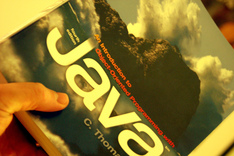Learn Java
|
Most schools choose to teach Computer Science courses in Java because:
Start by finding out whether you are expected to teach your Computer Science courses in Java, and if so, you will need to learn or brush up Java programming skills! Here are some ideas to help get you started. |
Read Your Class Textbook & Complete the Activities and Programming Assignments
As a beginning Computer Science teacher, you will likely be one day ahead of your students for at least part of the year! Get a jump start on the year by reading each chapter and completing the activities and programming assignments. This will help you learn Java or brush up on your Java programming skills, and it will help you decide which are the best activities to use with students. Be sure to make note of which activities you do and do not want to use!
As a beginning Computer Science teacher, you will likely be one day ahead of your students for at least part of the year! Get a jump start on the year by reading each chapter and completing the activities and programming assignments. This will help you learn Java or brush up on your Java programming skills, and it will help you decide which are the best activities to use with students. Be sure to make note of which activities you do and do not want to use!
Take an Online Course
- CompuScholar's Skill Building Class (free) - runs from May 1, 2021 through August 31, 2021
- WeTeach_CS Events & WeTeach_CS Courses
- Udacity: Java Programming Basics (free)
- MIT Open Courseware: Introduction to Programming in Java as taught in January 2010
Co-Teach
- TEALS (Technology Education And Literacy in Schools) partners high tech professionals as volunteer teachers in a team teaching model where the school district is unable to meet their students' computer science needs on its own. The high tech professional is first trained and mentored, and then he/she partners with the computer science teacher at a campus, with the goal of eventually handing off the CS courses to the classroom teacher.
When You Get to a Topic You Don't Understand or Don't Think You Can Explain to Students
This happens to every beginning Computer Science teacher! Here are some ideas to help you:
1. Read about the topic in a few other textbooks.
I often requested Computer Science textbooks from publishers to compare them to the textbook I was using in class. Having other textbooks allowed me to read about a computer science concept or a Java programming element from another teacher's perspective. Sometimes I read four or five textbooks' descriptions before I fully understood a topic or figured out how to best explain it to students! A list of my favorite textbooks are on the Textbooks > More Curriculum Resources page.
This happens to every beginning Computer Science teacher! Here are some ideas to help you:
1. Read about the topic in a few other textbooks.
I often requested Computer Science textbooks from publishers to compare them to the textbook I was using in class. Having other textbooks allowed me to read about a computer science concept or a Java programming element from another teacher's perspective. Sometimes I read four or five textbooks' descriptions before I fully understood a topic or figured out how to best explain it to students! A list of my favorite textbooks are on the Textbooks > More Curriculum Resources page.
|
2. Find and watch videos that explain or demonstrate the topic.
As with textbooks, it helps to watch a few videos by different authors. It is always helpful to me to hear and see a topic from multiple perspectives! Here are a few good YouTube channels and playlists to check out:
|
|
3. Connect with colleagues
Fellow and former Computer Science teachers are your best resource when you need help! Here are some ideas for connecting with people who are in or have been in your shoes:
Fellow and former Computer Science teachers are your best resource when you need help! Here are some ideas for connecting with people who are in or have been in your shoes:
- Ask questions or ask for specific resources on the TCEA Online Community in the TA/CS-SIG group. Our group can see your question and respond to you by posting in the Community or messaging you directly. Every question you ask is helpful to our entire online community!
- Network with other Computer Science teachers at the TCEA Computer Science Academy, and get their email addresses and Twitter handles. Get in touch with them when you need help!
- Ask a trusted colleague to explain or demonstrate the concept in person or in a Google+ Hangout, Skype, or Facetime.


